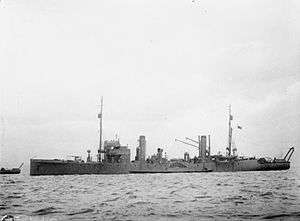Racecourse-class minesweeper
 HMS Plumpton | |
| Class overview | |
|---|---|
| Name: | Racecourse class |
| Operators: |
|
| Succeeded by: | Halcyon class |
| Built: | 1916 & 1918 |
| Completed: |
|
| General characteristics | |
| Displacement: |
|
| Length: | 235 ft (72 m) |
| Beam: |
|
| Draught: | 6.75–7 ft (2.06–2.13 m) |
| Propulsion: | Inclined compound. Cylindrical return tube. 1,400 hp (1,000 kW). |
| Speed: | 15 knots (17 mph; 28 km/h) |
| Range: | 156 tons coal |
| Complement: | 50-52 men |
| Armament: |
|
- For the class of ships sometimes known as the "Racehorse" class see 24 class sloop
The Racecourse-class minesweepers were 32 ships delivered to the Royal Navy during the First World War. They were built to two related designs as paddlewheel coastal minesweeping sloops under the Emergency War Programme. The vessels were reasonable sea-boats, but lost speed badly in a seaway when the paddle boxes tended to become choked with water. The class is also widely referred to as the Ascot class and Improved Ascot class.
Initial design
The original design was by the Ailsa Shipbuilding Company. The ships were completed between April and October 1916. Launch dates are shown below.
- HMS Ascot: January 1916, Ailsa S.B. Co—first of class, also last ship to be lost in World War I.
- HMS Atherstone: January 1916, Ailsa S.B. Co
- HMS Chelmsford: April 1916, Ailsa S.B. Co
- HMS Cheltenham: June 1916, Ardrossan Co
- HMS Chepstow: April 1916, Ayrshire D.Y. Co
- HMS Croxton: April 1916, Ayrshire D.Y. Co
- HMS Doncaster: June 1916 Ayrshire D.Y. Co
- HMS Eglinton: September 1916, Ayrshire D.Y. Co
- HMS Epsom: May 1916, G. Brown
- HMS Eridge: February 1916, Clyde S.B. Co. Originally fitted to carry seaplanes.
- HMS Gatwick: April 1916, Dundee S.B. Co.
- HMS Goodwood: June 1916, Dundee S.B. Co.
- HMS Haldon: March 1916, Dunlop, Bremner
- HMS Hurst: May 1916, Dunlop, Bremner
- HMS Kempton: Ferguson Bros. Lost in World War I.
- HMS Lingfield: April 1916, Fleming & Ferguson
- HMS Ludlow: Goole Co.—lost in World War I.
- HMS Melton: March 1916, Hamilton. Originally fitted to carry seaplanes.
- HMS Newbury: July 1916, A. & J. Inglis
- HMS Plumpton: McMillan—lost in World War I.
- HMS Pontefract: June 1916, Murdoch & Murray
- HMS Redcar: Ayrshire D.Y. Co.—lost in World War I.
- HMS Sandown: July 1916, Dunlop, Bremner
- HMS Totnes: May 1916, McMillan
On this type the foremast is stepped before the fore bridges and have derricks abeam of the second funnel.
Improved Racecourse type
These paddle minesweepers were designed by the Admiralty, adapted from the Ailsa Company design for the first type. They were completed between January and June 1918. All were built under the Emergency War Programme.
- HMS Banbury: December 1917, Ailsa S.B. Co.
- HMS Harpenden: February 1918, Ailsa S.B. Co.
- HMS Hexham: December 1917, Clyde S.B. Co.
- HMS Lanark: December 1917, Fleming & Ferguson
- HMS Lewes: March 1918, Fleming & Ferguson
- HMS Shincliffe: January 1918, Dunlop, Bremner
- HMS Shirley: Dunlop, Bremner. Sold as a ferry boat, 1919.
- HMS Wetherby: March 1918, Murdoch & Murray.
The foremast on this type is stepped through the chart house, there are two high ventilators abaft fore funnel and no derricks abeam of the second funnel.
Notes and references
External links
| Wikimedia Commons has media related to Racecourse class minesweeper. |